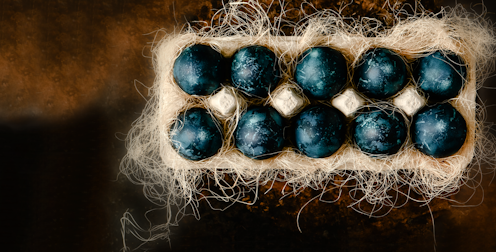Want to buy guilt-free Easter chocolate? Pick from our list of 'good eggs' that score best for the environment and child labour
- Written by John Dumay, Professor - Department of Accounting and Corporate Governance, Macquarie University

What do Beyond Good, Alter Eco, Tony’s Chocolonely and Whittaker’s all have in common? Besides producing delicious chocolate, they are the “good eggs” in this year’s chocolate scorecard.
Each is an industry leader in producing sustainable chocolate. By “sustainable” we mean doing the right thing to the planet and its people on measures as important as child labour, pesticide use, and deforestation.
The Chocolate Collective, made up of Australian charity Be Slavery Free and 20 other non-government organisations, with guidance from university experts and consultants, grades 90% of the industry and publishes the results in the lead-up to Easter, the biggest chocolate season of the year.
How we determine what’s a ‘good egg’
We scored 38 companies on six measures:
Transparency and traceability. This is the big one. If companies don’t know where their cocoa comes from, they cannot truly ensure it isn’t tainted by child labour, deforestation, and other abuses.
Child labour. More than 1.56 million children work in the cocoa industry. Around 95% of them are exposed to at least one type of hazardous labour as defined by the International Labour Organization.
Living income. Farmers are poor because of a combination of small farm size, low productivity, high costs, low prices and no alternative sources of income. Most earn about half of a so-called living income, able to provide enough food, water, housing, education, healthcare and provisions for unexpected events.
Read more: Turning to Easter eggs to get through these dark times? Here's the bitter truth about chocolate
Deforestation and climate. In 2020 alone, more than 47,000 hectares of forest was lost in the cocoa growing areas of Côte d'Ivoire. We explored how companies are minimising their contribution to deforestation through programs such as satellite monitoring their plans to reach net-zero carbon emissions.
Agroforestry. As opposed to pesticide-soaked monoculture, this is a more ecologically sound way of growing cocoa and restoring farm landscapes. We also looked at assessment, monitoring, and support to farmers using such methods. While we saw improvements, greater coordinated action is needed.
Agrichemicals. This theme is appearing in the chocolate scorecard for the first time. Overall, companies scored poorly, with many still uncommitted to action to reduce agrichemicals and failing to adequately protect farmers (especially children and pregnant women) from being poisoned.

